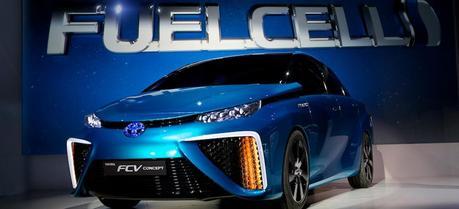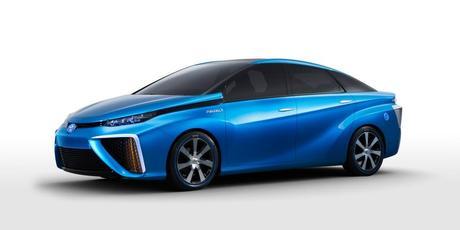 Toyota Motor Sales Senior Vice President of Automotive Operations Bob Carter debuts the Toyota Fuel Cell Concept at the 2014 Consumer Electronics Show in Las Vegas on Jan. 6, 2014. (Credit: Toyota Motor Corporation)
Toyota Motor Sales Senior Vice President of Automotive Operations Bob Carter debuts the Toyota Fuel Cell Concept at the 2014 Consumer Electronics Show in Las Vegas on Jan. 6, 2014. (Credit: Toyota Motor Corporation)
“We aren’t trying to re-invent the wheel; just everything necessary to make them turn,” said Bob Carter, senior vice president of automotive operations for Toyota Motor Sales (TMS), U.S.A. Inc., at the opening of CES, the world’s largest trade show. “Fuel cell electric vehicles will be in our future sooner than many people believe, and in much greater numbers than anyone expected.”
Two vehicles shared the stage at the Toyota press conference: The FCV concept, showing what the four-door mid-size sedan will look like in Radiant Blue; and the camouflage-taped engineering prototype used for extensive and extreme on-road testing in North America for more than a year. The prototype has consistently delivered a driving range of about 300 miles, zero-to-sixty acceleration of about 10 seconds, with no emissions, other than water vapor. Refueling of its hydrogen tanks takes three to five minutes.
“Hydrogen works beautifully with oxygen to create water and electricity and nothing more,” said Carter. “For years, the use of hydrogen gas to power an electric vehicle has been seen by many smart people as a foolish quest. Yes, there are significant challenges. The first is building the vehicle at a reasonable price for many people. The second is doing what we can to help kick-start the construction of convenient hydrogen refueling infrastructure. We’re doing a good job with both and we will launch in 2015.”
Since 2002, Toyota has been testing and developing a series of prototypes in North America. Toyota estimates a 95-percent cost reduction in the powertrain and fuel tanks of the vehicle it will launch in 2015, compared to what it cost to build the original prototype in 2002.
The FCV represents a major engineering achievement, where the size and weight of its powertrain system was significantly reduced while maintaining an impressive total power output of more than 100 kW. A fully-fueled vehicle will be capable of supplying enough energy to power a house for a week in an emergency. Engineers are currently looking to develop an external power supply device that could be used in this manner.
“There’s no doubt, that the success of this technology will depend less on the genius of the car, than on the ownership experience,” said Carter. “Cost is one thing, but convenience is another.”

Toyota Fuel Cell Vehicle Concept. (Credit: Toyota Motor Corporation)
Focusing on California, where the vehicle will be launched initially, Toyota has partnered with the University of California Irvine’s Advanced Power and Energy Program (APEP) to help map out potential locations for new hydrogen fueling stations.
The APEP spatial model considers a variety of data including R.L. Polk ownership of hybrid and electric vehicles, traffic patterns, population density, and so on. The model is based on the assumption that owners want to reach a refueling station within 6-minutes.
What the model produced was an initial cluster map that requires only 68 station sites in the San Francisco Bay area and Silicon Valley, as well as Los Angeles, Orange and San Diego counties. If implemented, the mapped system could handle a fuel cell population conservatively estimated by APEP at about 10,000 vehicles.
While specific sales volumes will be announced closer to launch, Carter said that Toyota has revised initial market plans and requested additional vehicles. More information will be announced in the weeks and months ahead, including U.S. sales volume targets, the name of the vehicle and comprehensive specifications and performance data.
As we reported in November 2013, the world’s first mass-produced hydrogen fuel cell car, the Hyundai Tucson Fuel Cell, begins mass production for the U.S. market in February 2014 at the Ulsan, Korea assembly plant.

